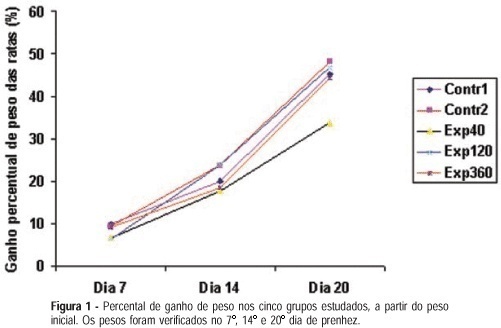Revista Brasileira de Ginecologia e Obstetrícia. 2006;28(3):184-189

PURPOSE: to evaluate the chronic effects of nelfinavir on body weight gain of pregnant albino rats and their concepts, as well as on the number of implantations, reabsorptions, fetuses, placentae, and maternal and fetal mortality. METHODS: fifty pregnant EPM-1 Wistar albino rats were randomly divided into five groups: two controls, Contr1 (control of stress) and Contr2 (drug vehicle control), and 3 experimental groups, Exp40, Exp120, Exp360, which received 40, 120 or 360 mg/kg per day of oral solution of nelfinavir, respectively. The drug and the vehicle (distilled water) were administered twice a day (12/12 h) by gavage from the first up to the 20th day of pregnancy. After sacrifice under deep anesthesia, the following parameters were evaluated: number of implantations and reabsorptions, the weight of fetuses and placentae, and the number of intrauterine deaths as well as inspection for major malformations. Data were evaluated by ANOVA followed by the Kruskal-Wallis multiple comparison test. RESULTS: body weight gain during pregnancy was normal for all the groups, and no significant differences were detected between them. ANOVA did not reveal any significant effect of nelfinavir on the studied parameters. The means of number of fetuses were: control = 9.7±0.50; nelfinavir-treated groups = 9.7±0.81. Regarding the means of number of placentae and implantations, controls = 9.7±0.50; nelfinavir-treated groups = 9.6±0.78. The mean fetal weights were as follows: controls = 4.04±0.50; nelfinavir-treated groups = 3.91±0.33 g. Finally, control placental weights averaged 0.64±0.02; nelfinavir-treated groups = 0.67±0.02 g. CONCLUSION: nelfinavir was well tolerated at all the administered doses; no damage was produced on the fetuses.
Search
Search in:


Comments